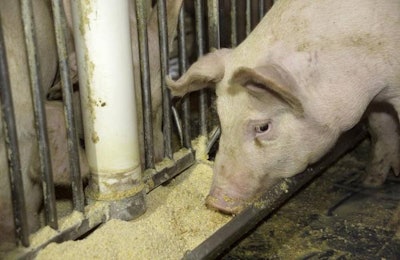
A recent study completed by Kansas State University (KSU) researchers located in Manhattan, Kansas, found that implementing medium chain fatty acids (MCFA) into a swine nutritional program adds a layer of protection against porcine epidemic diarrhea virus (PEDv). After 8 million hog lives were claimed by the virus in 2014, researchers have been looking for various ways to prevent future outbreaks.
PEDv is a coronavirus that infects the cells lining the small intestine of a pig, causing PEDv, a condition of severe diarrhea and dehydration.
The virus is still impacting operations globally. In June, Manitoba, Canada reported 45 PEDv positive sites. Before the June 30 outbreak, in 2017 alone PEDv in Manitoba was affecting over 54,000 sows, 126,000 nursery spaces and just over 99,000 feeder spaces, according to the Manitoba Pork Council.
Other studies have tried combinations of organic acids to control pathogens that can be a source of PEDv transmission.
The KSU study and findings
According to the report summary freshly released by the university, “Medium chain fatty acids are a category of fatty acids known for being easily absorbed by a human body, and many are considered necessary fats that humans need for living well.”
The researchers at KSU have concluded that those medium chain fatty acids have an impact on feed efficiency and pig growth and gain that may offer a positive opportunity for producers from an economic standpoint, while still helping to prevent a virus that could be detrimental to one’s operation.
“The impact of these findings should be substantial because now the industry can use a single feed additive that can act to minimize the risk of virus transmission as well as improve animal performance,” said Jason Woodworth, an associate professor in the department of animal sciences and industry in the report released by the university.
The study concluded that hogs showed an increase in average daily gain and feed intake. A doctoral student, Jordan Gebhart, at KSU conducted the trial over the course of 35 days at the university's segregated early weaning facility, which Woodworth noted makes the study more appealing as it is the university’s higher health status research facility.
The process of the research included adding synthetic grade fatty acids, which are not currently available for producers and their feeding programs. This is a challenge but something the researchers are aware of and with their recent findings they now plan to find a way to duplicate their results using products that are commercially available.
“Developing and validating such products in commercial-scale swine operations is an important future step in the research process and is needed before the industry will adopt the technology,” Gebhart said.
Woodworth added that the university researchers are testing the fatty acids against other viruses, bacteria and pathogens to find the most appealing combination for commercial feeders. This may result in fatty acids being used as an alternative to feeding antibiotics, the report suggested.
“Previous research has indicated the value of MCFA at reducing the risk of disease transmission within swine feed and feed mills, and the current study confirms there is additional value by improving growth performance,” said Gebhart. This could open doors in the future for commercial swine producers if implemented in their feeding programs, Woodworth added.
The university is also working on other research projects related to fatty acids and the potential they have in various forms of livestock species.















